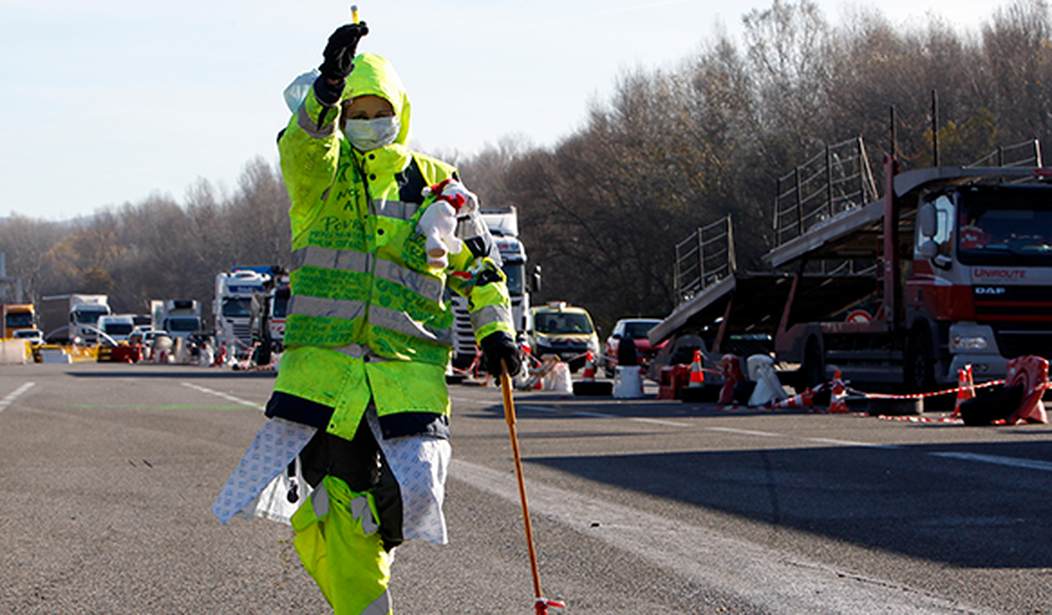PARIS -- As of this writing, there have been 1,412 confirmed cases of the coronavirus here in France, and 30 people have died from it. In a country where it's customary to spend the first several minutes of each workday air-kissing the cheeks of your colleagues, it's a miracle this virus hasn't KO'd even more people. One reason it hasn't could be a long-festering lack of trust in the French government to manage any situation, which has led to increased self-reliance.
According to a poll taken here last year by the newspaper La Tribune, 88 percent of the French admitted they don't trust political parties, and 76 percent expressed a lack of confidence in their elected federal representatives.
There have been Yellow Vest protests in France nearly every weekend since October 2018, with average taxpaying citizens putting their foot down on yet another blatant government cash grab -- in this case, a carbon tax on auto fuel. The government's response? Violence.
French police have occasionally fired rubber bullets at Yellow Vest protesters. The prestigious medical journal The Lancet documented 22 open-globe eye injuries and 18 cases of ocular bruising in France caused by so-called "less lethal weapons" in 2018 and 2019, including two cases of brain damage. The Lancelet concluded that the "increase in severe, blinding, traumatic eye injury in France in the past 10 months could be related to use of guns for crowd control."
We're not talking about Iran or China here, but France -- a country that baked human rights into its constitution. No one at the U.S. State Department has criticized the French government's use of rubber bullets and sting ball grenades against anti-taxation protesters, some of whom have been disfigured.
Recommended
While the rest of the world has mostly ignored the agitation in the French streets, these protests were quietly chiseling a new notion into the minds of French citizens, chipping away at the idea that government will protect them. Not only that, it might also kick your ass (or damage your eyes).
Enter the coronavirus.
The French government has requisitioned all of the protective face masks for frontline personnel. Meanwhile, everyone else is left to get by with useless but annoyingly repetitive coronavirus announcements in the subway system (in case you've just emerged from under a rock and stepped straight onto a subway train). The government has also plastered posters on public property explaining what to do if you experience coronavirus symptoms. It's reminiscent of the posters that went up in the wake of major terror attacks on French soil a few years ago, illustrating the proper response. The posters suggested hiding, and if that didn't work, then fleeing.
The French aren't waiting around for the government to do the thinking for them this time. Many citizens no longer trust the government to place their interests above globalist ideology. For example, many French have long figured that the border with neighboring Italy (which has seen 9,172 coronavirus cases and 463 related deaths) would never be closed, no matter how much the virus spread, because it would suggest that there are actual borders within the European Union.
It's a contrast to the response in Russia, whose leadership is often criticized in the West for politically unpopular positions that go against "progressive" ideology. Russia didn't hesitate to throw up barriers, closing its border with coronavirus hotbed China in late January, banning high-risk flights, maintaining strict screening at border checkpoints and placing Russian expats evacuated from the Chinese city of Wuhan in quarantine for three weeks -- in Siberia. The result: 17 reported coronavirus cases as of March 10 despite a reported total of 51,000 administered tests.
Which governments would you most trust to competently manage this epidemic -- those that don't care about how they're perceived politically, or those for whom perception counts above all else?
At the moment, there's no more panic (or emptiness) in the streets of Paris than there is when there's a rare snow or ice storm -- events for which the French government is always unprepared. A few gym patrons and public transit riders are donning latex gloves these days. The French have dialed back on the cheek-kiss greetings, much to the delight of this native North American.
Madonna concerts and the annual Paris half-marathon have been canceled. Other events of more than 5,000 people have been called off or postponed, and schools have been closed in some areas. The French government has said that it may take more social distancing measures if the virus continues to spread, if only to prevent the health care system from being overwhelmed. But no one here seems to be waiting around for the state to save them. The French are saving themselves.

























Join the conversation as a VIP Member